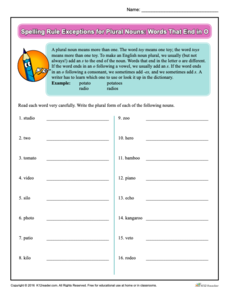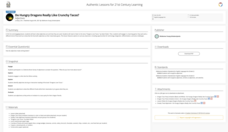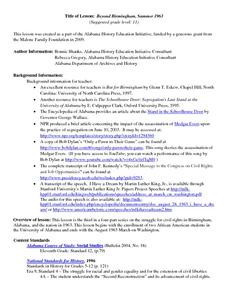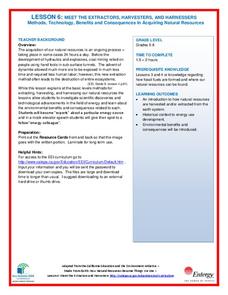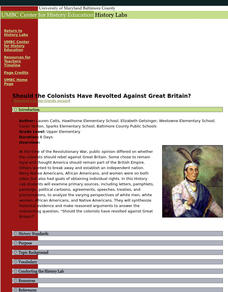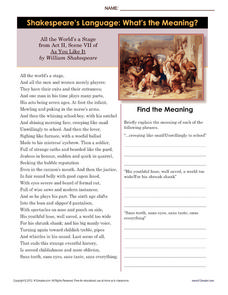K12 Reader
Conjunctions: Or
Flower or tree? Rabbit or goat? Hamburger or hot dog? Young grammarians practice connecting nouns with conjunctions in a worksheet that focuses on using the word or.
K12 Reader
Which Is It: Subordinating or Coordinating Conjunction?
To demonstrate their understanding of the difference between subordinating and coordinating conjunctions, learners identify and label the conjunctions found in 10 sentences.
K12 Reader
Writing with Subordinating Conjunctions
Challenge young grammarians to turn sets of phrases into sentences by adding subordinating conjunctions on a short worksheet.
K12 Reader
Spelling Rules: Add S to Nouns to Make Them Plural
Would you like more than one cat? Or more than one prize? Learn how to make singular nouns plural by adding an -s to the end of each word.
K12 Reader
Spelling Rule Exceptions for Plural Nouns: Words That End in O
Why do heroes and photos end in different ways? Learn the differences among different words that end in -o with a grammar exercise worksheet.
K12 Reader
Plurals: Nouns and Verbs Ending in Y
If a word ends in -y, to make it plural you change it to -es, right? Not always! Use a worksheet that addresses both nouns and verbs that end in -y and prompts learners to follow the grammar rule when changing each word.
K12 Reader
S or ES: Plural Words
One frog is fine, but two frogs are better—and more challenging, grammatically speaking! Challenge elementary learners to make six singular nouns into plural nouns with a handy instructional activity.
K12 Reader
Identifying Nouns
What's more fun than an afternoon at an art auction? A morning with a grammar worksheet! After reading a short story about Jillian's trip to the art auction, learners jot down every noun from the passage, labeling each one as either...
K12 Reader
Color the Nouns: Kite
Go fly a kite! Young grammarians find the nouns in a selection of words that make up an illustration of a kite. Once the nouns are colored red, the kite is easy to see!
K12 Reader
Conjunctions: Connecting Predicates
Forget walking and chewing gum—the subjects of these sentences can perform several actions at once! Practice connecting predicates with conjunctions in a helpful grammar worksheet.
K20 LEARN
Do Hungry Dragons Really Like Crunchy Tacos?: Adjectives
Tacos are the theme of a lesson all about adjectives. Scholars list as many adjectives as possible to describe tacos and play a game of Not Like the Others before reading Dragons Love Tacos by Adam Rubin. Peers guess their favorite foods...
Curated OER
Introducing Nouns and Verbs
Second graders accurately identify nouns and verbs in sentences. In this nouns and verbs lesson, 2nd graders sing a jingle to help them identify characteristics of nouns and verbs. Students classify pictures in the proper category and...
Curriculum Corner
Fry Lists
Keep track of your learners' mastered sight words with 11 sets of words. Four columns list the words, as well as three columns for you to mark the date of mastery.
Social Media Toolbox
Law Review
How can your journalism class ensure they use social media responsibly and legally? The sixth lesson in a 16-part Social Media Toolbox series asks pupils to dig deep into the legal aspects of social media use by school publications....
Curated OER
Grammar Quest
Students participate in an activity that helps them to explain parts of speech and distinguish between them. They also use different locomotor skills in a variety of ways.
Alabama Department of Archives and History
Beyond Birmingham, Summer 1963
The assassination of Medgar Evers. The integration of the University of Alabama. The March on Washington. The "I Have a Dream" speech. Created by the Alabama History Education Initiative, this resource examines how the events that...
Fluence Learning
Writing About Informational Text: The Dred Scott Decision
Looking for a performance assessment that asks individuals to demonstrate their competency in writing about informational text? Use Frederick Douglass' essay "On the Dred Scott Decision," and an excerpt from Abraham Lincoln's 1857 speech...
California Education Partners
Hope Despair Memory
Elie Wiesel's "Hope, Despair and Memory" provides ninth graders an opportunity to demonstrate their ability to analyze complex text. Individuals craft an essay that draws evidence from the text of the speech to show how Wiesel develops...
National Wildlife Federation
Meet the Extractors, Harvesters, and Harnessers: Methods, Technology, Benefits and Consequences in Acquiring Natural Resources
There are advantages and disadvantages to all sources of energy; the trick is determining which one has the least impact! Part six in the series of 12 has learners further explore energy resources. After reading information about one of...
Civil War Trust
Gettysburg Address
The Gettysburg Address may have been four score and seven years ago, but its message is still as relevant today. Young historians explore the context of the famous speech, as well as its central theme and argument, before discussing the...
Trinity University
Julius Caesar: The Power of Persuasion
"Friend, Romans, countrymen, lend me your ears..." Those words begin one of the most persuasive speeches in literature. Explore the elements of persuasion in a series of lessons related to William Shakespeare's Julius Caesar. In addition...
Center for History Education
Should the Colonists Have Revolted Against Great Britain?
Should the Americans have taken the plunge and revolted against Great Britain? Using documents, including the famed Common Sense and a Loyalist response, pupils conduct a lengthy investigation of the question. The interesting resource...
K12 Reader
Shakespeare's Language: What's the Meaning?
You needn't be an actor to stage this exercise in reading comprehension. Kids examine Jacques's "All the World's a Stage" speech from Act II, scene ii, of As You Like It, and explain the literal meaning of the figurative language. There...
ThoughtCo
Back to School Means...(Concept Web)
Going back to school doesn't have to be scary! Brainstorm what Back to School means with a concept web graphic organizer.






